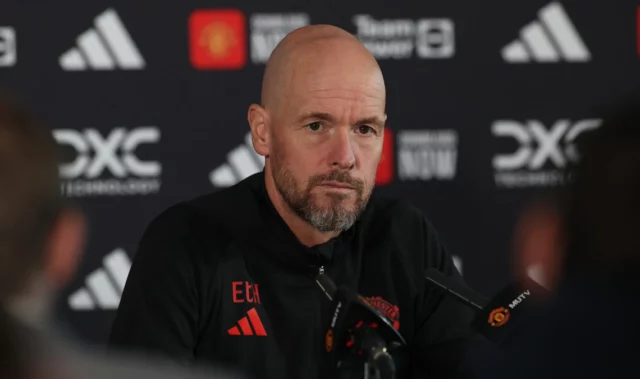Manchester United Football Club has made headlines yet again, but this time it’s not for their on-field performance. The club recently stirred up controversy by banning journalists from four media outlets – Sky, ESPN, Manchester Evening News, and the Mirror – from attending Erik ten Hag’s news conference. The decision came in response to what the club perceived as negative stories being published without giving them the opportunity to respond or clarify their stance.
United Takes Action Against Negative Reporting
In a strongly-worded statement, Manchester United explained their reasoning behind the ban. They emphasized that it wasn’t about suppressing unfavorable news but rather about the importance of journalistic ethics and responsible reporting. The club firmly believes that media organizations should contact them first to provide an opportunity for comment, challenge, or context before publishing stories.
The ban was seen as a direct response to reports suggesting that some players within the team were unhappy with Erik ten Hag’s management. United felt that these reports lacked proper communication with the club, leading to a breakdown of trust. By excluding journalists from the affected outlets, the club sought to send a message about the need for a collaborative and transparent relationship with the media.
The Journalists’ Perspective
The Manchester Evening News, one of the media outlets affected by the ban, has publicly criticized Manchester United for their decision. The newspaper expressed their disappointment, arguing that the club’s actions hindered press freedom and restricted their ability to report on important events. The ban was perceived as an attempt to control the narrative and silence critical voices rather than fostering open dialogue.
Erik ten Hag’s Response
During the news conference, Erik ten Hag addressed the controversy, expressing his disappointment with journalists for not approaching the club first. He emphasized the importance of open communication and stated that if players had different opinions, he would be willing to listen. However, Ten Hag clarified that the majority of players were in support of the current proactive, dynamic, and brave style of play.
Seeking a Reset in Media Relations
Manchester United’s decision to ban journalists from the news conference reflects their desire for a reset in the way they collaborate with media organizations. The club aims to establish a stronger foundation of trust and cooperation, ensuring that news stories are presented in a fair and accurate manner. By emphasizing the principle of contacting the club for comment, challenge, or context, United hopes to foster a more constructive relationship with the media moving forward.
The Impact on Manchester United
While the ban has generated significant attention, it remains to be seen how it will affect Manchester United’s relationship with the media in the long term. The club’s decision to take a firm stance may deter journalists from reporting negatively without proper verification or input from the club. On the other hand, it may also lead to increased scrutiny and skepticism towards the club’s actions, potentially fueling more controversy.
The Premier League Clash with Chelsea
Amidst the ongoing media storm, Manchester United faces a crucial Premier League clash against Chelsea. The outcome of the match could have a significant impact on the team’s standing and the perception of Erik ten Hag’s managerial capabilities. It remains to be seen how the controversy surrounding the ban will affect the players’ performance and overall team morale.
Conclusion
Manchester United’s ban on journalists attending Erik ten Hag’s news conference has ignited a heated debate about press freedom and responsible reporting. While the club aims to encourage a more collaborative approach with the media, the decision has drawn criticism from affected outlets. As the Premier League season unfolds, it will be interesting to observe how this controversy influences Manchester United’s relationship with the media and the team’s performance on the pitch.


